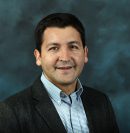The Michigan Alliance for Animal Agriculture (M-AAA) has awarded $2.7 million to 22 new research and outreach projects led by researchers and educators from Michigan State University and MSU Extension.
Five projects led by MSU College of Veterinary Medicine researchers are among the projects funded this year by M-AAA, which is a partnership among MDARD, Michigan animal agriculture organizations, and MSU that fast-tracks research into real-world agricultural solutions. The M-AAA offers competitive grants in the categories of applied research, outreach, and seed funding.
“I’ve seen firsthand how support from the Michigan Alliance for Animal Agriculture turns research into real-world solutions for Michigan’s producers and communities,” said Dr. Adam Lock, interim chair of the Department of Large Animal Clinical Sciences and professor in the Department of Animal Science. “These grants are instrumental in translating research into practical innovations — solutions that directly enhance animal health, production efficiency, and sustainability across Michigan’s livestock industries.”
Seed Grants: Big Ideas, Early Stage

Dr. Mayra Tsoi, assistant professor in the Department of Pathobiology and Diagnostic Investigation and the Veterinary Diagnostic Laboratory, received funding for her proposal "Chronic exposure to imidacloprid in laying hens and its persistence in poultry products." Her project builds on research published in the May 2, 2025, issue of the Journal of Agricultural and Food Chemistry, which suggests that even low-dose exposure to the pesticide imidacloprid may cause poultry products to violate federal safety standards.

Dr. Andres Contreras, professor in the Department of Large Animal Clinical Sciences, is exploring the role iron plays in enhancing the effects of chromium on milk production. His project, "The Ironic Effect: Uncovering the Role of Iron in Chromium-Mediated Enhancement of Lactation Efficiency in Dairy Cows," is backed by a Seed Grant. It builds on his January 2025 publication in the Journal of Dairy Science focused on nutritional strategies to boost cow health around calving. Contreras also has an appointment with Michigan AgBioResearch.
Applied Research: Ready for the Real World
Contreras also secured Applied Research funding for "The pH Factor: How DCAD Diets Regulate Fat Mobilization." DCAD, or Dietary Cation-Anion Difference, influences blood pH and acid-base balance — a critical factor in dairy cow performance before and after calving. A carefully managed DCAD diet can mean better milk yield and healthier cows.

Dr. Pamela Ruegg, David J. Ellis Chair in Antimicrobial Resistance and professor in Large Animal Clinical Sciences, received support for her project, "Evaluation of a Novel Intervention to Reduce Risk of Shedding Antibiotic Resistant Bacteria in Manure After Use of Intramammary Dry Cow Antibiotics in Dairy Cows." Ruegg, who leads the Antimicrobial Stewardship & Dairy Health Management Lab, recently authored a February 2025 MSU Extension article titled Selective Dry Cow Therapy: One Tool to Reduce Antibiotics on Your Dairy Farm. Ruegg also holds appointments with Michigan AgBioResearch and MSU Extension.

Dr. Pedro H.E. Trindade, assistant professor of Food Animal Health, Welfare, and Production in Large Animal Clinical Sciences, is investigating whether the age at which dairy calves are disbudded affects long-term health and productivity. His project, "Can the age of disbudded heifers minimize long-term impacts on pain, health, and production?", continues work that includes Clinical Validation of the Unesp-Botucatu Acute Pain Scale in Sheep Undergoing Orthopedic Surgery (PLOS, May 2025) and Proposing a Short Version of the Unesp-Botucatu Pig Acute Pain Scale Using a Novel Application of Machine Learning Technique (Scientific Reports, February 2025).
A Solid Michigan Partnership
"This funding from the Michigan Alliance for Animal Agriculture is a great example of how financial support for science has real world impact," said Dr. Dalen Agnew, professor and chair of Pathobiology and Diagnostic Investigation. "This funding helps Michigan farmers use the latest information from leading MSU scientists so that they can have healthier animals and more profitable operations."
